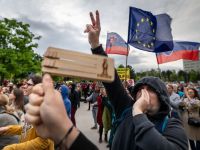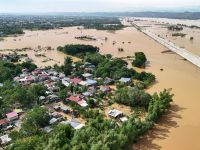A Palestinian was killed Saturday by an explosive charge he detonated on the "Green Line" separating Israel from the West Bank near the Palestinian city of Tulkarem, Israeli police said.
"The man was setting off a charge that he had brought with him to the (Israeli) borderguard checkpoint and it killed him on the spot," a military spokesman told AFP, adding the explosion had caused no injuries on the Israeli side, close to the town of Shaarei Ephraim.
Mohammad Farraj, 28, was a member of the radical Palestinian movement Islamic Jihad from the nearby Nur al Sham refugee camp, Palestinian security sources said.
The man planned to blow himself up in a Tel Aviv suburb, the Israeli spokesman said.
The spokesman added that the Palestinian was probably preparing a suicide attack and that the bomb went off prematurely.
The death raised the toll for the nearly 15-month-old Palestinian uprising against Israeli occupation to 1,102, including 846 Palestinians and 233 Israelis.
Attack on Gaza
Israeli helicopters attacked a refugee camp north of Gaza City early Sunday, just hours after a frustrated United States recalled its Middle East peace envoy Anthony Zinni. Two military helicopters launched missile attacks on a Palestinian police station and another security building in the Jabaliya refugee camp north of Gaza City, a senior Palestinian security source told AFP Sunday.
There were no reports of injuries. The Palestinian source said that the two-storey police station had nearly collapsed and that the nearby building used by the personnel of the head of preventive security in the Gaza Strip, Mohammed Dahlan, was hit head-on by the missiles.
A spokesman for the Israeli army confirmed it had launched a helicopter attack on Palestinian security buildings in the north of the city.
Earlier in the day, the Israeli army had pulled out of the nearby Palestinian town of Beit Hanun, just north of Jabaliya. Four Palestinians were killed during the incursion.
Those killed were a Palestinian border policeman, two teenagers and 12-year-old boy, while another 75 were injured, Palestinian officials said.
Another Palestinian was killed near the Gush Katif settlement bloc overnight by the army, which suggested he may have been planning an attack.
The latest Israeli action came after Washington announced the recall of Zinni, whose three-week mission in the region coincided with an increase of violence and no breakthrough in the peace process.
Zinni was dispatched on November 26 on the first Middle East peace mission under the administration of President George W. Bush, but since then 109 people have been killed in a vicious cycle of attack and counter-attack.
However, State Department spokesman Richard Boucher insisted the United States had not yet given up, saying "General Zinni will remain engaged and return to the region".
Both Israel and the Palestinians, locked in bitter conflict since the start of a Palestinian uprising in September 2000, voiced hopes that Zinni would return, each blaming the other for his recall.
"His recall is a US decision but it is obvious it is caused by the Palestinian refusal to respect their engagements regarding the ceasefire," Prime Minister Ariel Sharon's spokesman Raanan Gissin said.
And Palestinian negotiator Saeb Erakat charged: "Since he started his mission, Israel has killed 67 Palestinians and reoccupied parts of the West bank and Gaza."
The US decision follows its veto of an Arab-sponsored UN Security Council resolution on the crisis that called for international monitoring.
The United States was exercising its veto power for only the second time in more than four years, and once again put the pressure back on Palestinian leader Yasser Arafat, dismissed by Israel as "irrelevant".
"Unfortunately the resolution... never mentions the recent acts of terror against Israelis or those responsible for them," said US ambassador at the UN, John Negroponte.
Arafat advisor Nabil Abu Rudeina warned the veto would bolster Israel's military escalation, echoing the sentiments of many in the Arab world.
Arab foreign ministers will meet in Cairo next week to discuss the deepening crisis following an urgent Palestinian demand.
Under virtual Israeli house arrest in his headquarters in the West Bank town of Ramallah, with Israeli tanks only 200 meters (yards) away, Arafat was due make a televised speech to his people Sunday to mark Eid el-Fitr, the feast ending the Muslim fasting month of Ramadan.
Analysts suggest the embattled 72-year-old leader could call for an end to the intifada that has now cost 1,102 lives.
And late Saturday, Palestinian police announced that 13 offices in the Gaza Strip used by Hamas and Islamic Jihad, the two radical groups behind most anti-Israeli attacks, had been closed on the orders of Arafat's authority.
A Palestinian security official told AFP that the Palestinian Authority was also closing Hamas and Jihad offices in the West Bank, but did not elaborate.
Russia, a co-sponsor of the Middle East peace process with the United States, condemned the Israeli attacks on Palestinian targets.
"The choice of these (Israeli) measures will not solve the problems that have accumulated in Israeli-Palestinian relations," President Vladimir Putin said in Moscow.
An EU statement urged Israel to negotiate with Arafat "the elected president of the Palestinian Authority" despite the Jewish state dismissing him as "irrelevant."
"His capacity to combat terrorism must not be weakened," it said. – (AFP, Gaza)
© Agence France Presse 2001
© 2001 Al Bawaba (www.albawaba.com)







